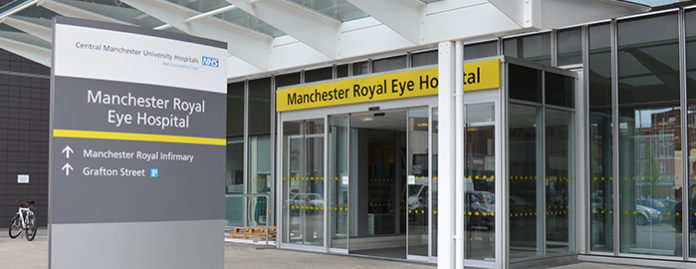A patient at Manchester Royal Eye Hospital (MREH) has become one of the first patients in the UK to undergo a revolutionary new surgery for a rare inherited retinal disease. It is one of the first gene therapy treatments undertaken in the NHS in the UK, and the first at Manchester University NHS Foundation Trust (MFT).
The pioneering Ocular Gene Therapy treatment was performed on Monday 27th January by Mr Assad Jalil and Ms Tsveta Ivanova, Consultant Vitreoretinal Surgeons, alongside a multi-disciplinary team at MREH, part of MFT, for a rare genetic retinal condition, which has previously been untreatable.
MREH patient, Lee Morris, 39, from Chorley in Lancashire, is one of the first NHS-funded patients in the UK to receive this ground-breaking surgery, in the hope of improving his eyesight.
He said; “I feel like I’ve waited 39 years for this surgery and I am very grateful to be the first patient to undergo this treatment at MREH. Of course, I am hoping for improvements to my vision but this was an opportunity that I just couldn’t miss out on, and could be potentially life-changing for me.”
Lee, who works at a travel company in Leyland, added; “Early indications are that the surgery was a success and I feel like I am recovering well following the procedure. For the next few months,
doctors will monitor my progress and I am hopeful this treatment will open so many more doors for me – not just at work in being able to go for promotions, but to increase my confidence in going out alone. Winter is an especially difficult time for me as it’s so dark and I have no night-time vision at all.”
Lee had vision problems from birth and at 8 years old was diagnosed with RPE65 retinal dystrophy, a rare inherited retinal condition caused by defects in one of a number of different genes. One of these genes, RPE65, makes a protein found in the retina – the light sensitive film at the back of the eye that is vital for sight. The faulty gene causes vision to deteriorate and may lead to almost complete loss of vision. For Lee, his sight then further deteriorated over a number of years and he has been told his vision is now around 10% in good light. He has no peripheral vision or night-time vision.
Mr William Newman, Medical Director and Consultant Paediatric Ophthalmologist, at MREHled the multi-disciplinary ocular gene therapy team which included paediatric ophthalmology, vision scientists, clinical genetics and pharmacy colleagues. He said;
“We’re delighted to be able to offer our patients the opportunity to undergo this revolutionary new treatment at MREH and I am pleased that Lee’s procedure has been successful and he is recovering well.
“We have a proud history of pioneering new therapies for our patients and this important new surgery could represent real progress for people with this rare genetic condition.”
The new gene therapy treatment is suitable for a very small group of adults and children with retinal dystrophies caused by a fault in the RPE65 gene. The treatment, called Voretigene neparvovec (Luxturna), is given during the surgical operation to put a normal copy of the gene under the retina. Since a mutation in RPE65 prevents normal vision, the delivery of a correct copy of the gene can help to improve vision, and prevent sight from worsening.
Mr Assad Jalil, the Consultant Vitreoretinal Surgeon who undertook the procedure, said; Treating inherited retinal diseases is extremely challenging but gene therapy offers hope to all such patients. Subretinal Luxturna injection is probably the first of many such gene therapy based treatments, which will become available in the future. We at Manchester Royal Eye Hospital are proud to be a part of this genomic revolution.”
In eligible patients, treatment is given to one eye at a time and recovery time can be over a number of weeks, although can vary between patients. If successful, the treatment can improve navigational ability, as well as light sensitivity and visual fields.







